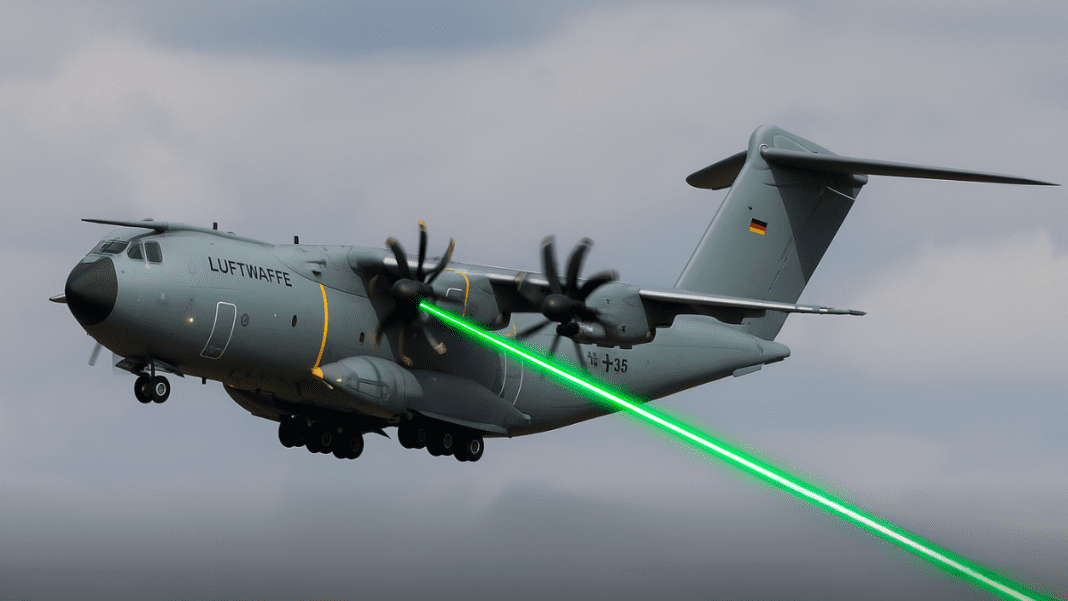China allegedly targeted a German military aircraft with a laser. In response, Germany officially condemned the act. The German aircraft was flying as part of the European Union’s ASPIDES mission. This mission focuses on protecting maritime security in key international waterways. These areas include the Red Sea, the Indian Ocean, and the Gulf.
German Aircraft Targeted by Laser in EU Maritime Mission
This serious incident reportedly took place while the German aircraft was on patrol as part of the EU operation. Following the event, Germany summoned the Chinese ambassador to its foreign ministry in Berlin on Tuesday to express strong disapproval. German officials described the act as a clear danger to its personnel and a disruption to an important international mission.
The German foreign ministry used the social media platform X to issue a public statement saying, “Putting German personnel at risk and disrupting the operation is completely unacceptable.” This statement marks a rare and strong diplomatic message from Germany, underlining the seriousness of the situation.
The ASPIDES mission is a part of the European Union’s broader Common Security and Defence Policy (CSDP). It aims to protect commercial shipping routes that are vital for global trade. These areas are often hotspots for piracy, missile threats, and other risks, making the mission crucial for both European and international shipping security.
Britain and Germany Sign Historic Defence Pact to Counter Russia
At this time, no detailed account has been shared about exactly how or when the laser was used against the aircraft. However, laser targeting from military sources can have serious consequences, including the blinding of pilots and damage to sensitive aircraft systems. The use of such tactics is widely seen as provocative and highly dangerous, especially during ongoing multinational operations.
Silence from China and the EU Raises Laser Concerns
So far, there has been no official response from China’s foreign ministry regarding the incident. The Chinese embassy in Berlin also did not answer an emailed request for comment, according to sources. Likewise, the European Commission has not released a public statement or comment at the time of reporting.
This lack of immediate clarification has led to growing concerns within European diplomatic and defense circles. The incident arrives at a time when Europe is becoming increasingly cautious about China’s growing military presence and technological influence. In recent months, European officials have raised alarms about the security of critical infrastructure, digital systems, and the reliability of global partnerships with China.
Germany and France Sound Aviation Alarm: “EU Tariffs Could Cripple Airbus-Boeing Supply Chain”
This latest confrontation adds a fresh layer of tension to already complex EU-China relations. While the countries remain important trading partners, actions like the laser incident could lead to more friction and deeper mistrust, especially in areas related to defense and military coordination.
Chinese forces may have intentionally directed the laser, but that is still unclear. It is also possible they used it as part of broader activity in the region. Experts say using lasers in military operations is dangerous. They consider such actions near aircraft a hostile act under international standards.
ASPIDES: Protecting Global Shipping from Air and Sea
The ASPIDES mission, launched by the European Union, has become an essential part of safeguarding maritime trade and preventing security threats in regions where tensions are high. The operation covers areas where several countries, including China, operate military units, making coordination and communication critical to avoiding dangerous misunderstandings.
German forces participating in the mission are tasked with surveillance, escorting commercial vessels, and reacting to potential threats. The aircraft involved in the incident was likely carrying out one of these routine tasks when it encountered interference from the laser.
Military lasers are not ordinary devices. They are often used to target, track, or disable equipment. If pointed at an aircraft cockpit, lasers can temporarily blind or confuse pilots, increasing the risk of accidents. That’s why international rules prohibit such actions during peacetime operations, especially in shared international airspace or seas.
Germany Deploys First Iris-T Air Defense System on Home Soil
Germany’s firm response reflects not only its concern for the safety of its crew but also the importance of maintaining peace and cooperation during joint international missions. The incident serves as a reminder of the many dangers faced by defense personnel who operate in volatile areas, even when their mission is purely defensive.
The EU has repeatedly stated that ASPIDES is a non-aggressive mission, focused only on protecting shipping routes. It plays a key role in responding to missile threats, piracy, and potential attacks on commercial ships, which are vital for global trade and supply chains.
While Germany has made its stance clear, further updates from the EU or Chinese authorities are still awaited. Until then, the laser incident remains a troubling example of rising tensions in international defense operations.
